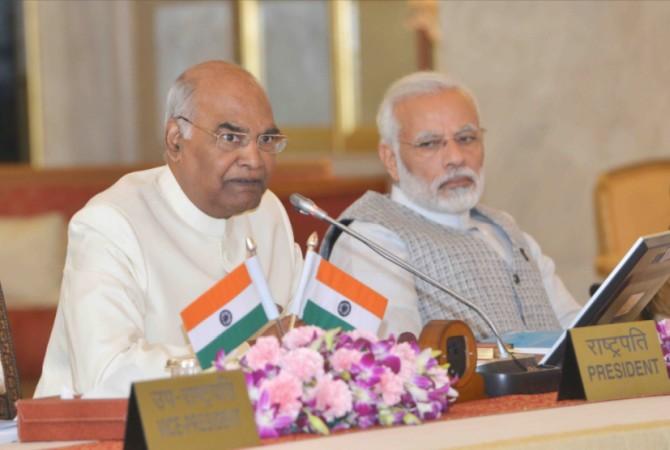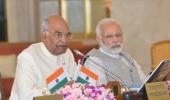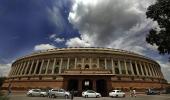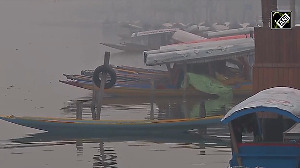That's a deficit the NDA will have to make up with the help of 'friendly' alliance partners, the very groupings the PM has said are 'family-run', reports Aditi Phadnis.

The national parties are dismissive about them. At the Udaipur consultation of his party, leader Rahul Gandhi said the Congress is the only alternative to the Bharatiya Janata Party and regional parties, which are casteist and therefore limited in their appeal, cannot fight the BJP in the way the Congress, a national party, can.
This, despite the fact that in 2004 (and 2009) the Congress could come to power only via carefully scripted alliances with regional parties.
He refined his comments later, but the damage had been done.
The BJP's attack on regional parties is not that they are regional, but that they are 'family-run'.
Prime Minister Narendra Modi took blistering broadsides at the Telangana Rashtra Samiti in Hyderabad recently.
This was a variation on the same theme he used to criticise the Samajwadi Party in the Uttar Pradesh assembly elections, the Dravida Munnetra Kazhagam during the 2021 assembly election campaign in Tamil Nadu, and during other campaigns.
But in the upcoming Presidential elections, the BJP-led National Democratic Alliance faces a deficit of more than 11,000 votes -- a deficit the NDA will have to make up with the help of 'friendly' alliance partners, the very groupings the PM has said are 'family-run'.
In a paper on regional parties in 2013, Milan Vaishnav, senior fellow and director of the South Asia programme at the Carnegie Endowment for International Peace, demolished many myths about the depth and width of influence of regional parties.
'The share of votes won by regional parties cracked the 50 per cent mark for the first time in 1996. Then the engine sputtered somewhat. By 1999, the vote share of regional parties had dipped to 48 per cent.
'By 2004, their vote share crept back up to 51 per cent, the same level it had been eight years earlier, before modestly rising again in the 2009 elections,' Dr Vaishnav said.
His conclusion was: 'The regional revolution in contemporary Indian politics should not be overstated. India's regional parties have indeed already risen; whether they can rise further is unclear.'
Yet, like a persistent rash, regional parties just won't go away.
They won 13.75 per cent of the total valid votes cast in the 2019 Lok Sabha elections and won 136 seats in the 545-member House (this does not include the Trinamool Congress which got national party status in 2016).
They are in power on their own in six states. They are part of an alliance with national parties in 10. And reports of their death appear to be highly exaggerated.
But what does the persistence of regional parties mean for India's alliance politics?
The Congress and the BJP, both dominant national parties, have had to do deals with regional parties in several states to stay in power.
In the Haryana assembly elections (2019), for instance, the BJP suffered a huge attrition in seats and could only come to power after it did a post-election deal with the Dushyant Chautala-led Jannayak Janata Party.
Similarly, the Congress became a partner in the alliance with the DMK in the 2021 assembly election and was able to spare its blushes in a state it ruled a few decades ago.
Senior Congress leaders say it is hard to say how much vote share the Congress would have got if it had contested the election on its own.
At the same time, the exit of the Shiv Sena and the Shiromani Akali Dal from the NDA and the unstated exit of the SP from the Congress-led United Progressive Alliance suggest changes are taking place in the alliance politics space.
'On the one hand, alliance politics is always in some degree of flux. Some alliance is always ending, while new ones are always taking shape. In particular, the BJP's growth has upset many prior patterns of alliance formation. Naturally, the BJP does not want to be the junior partner in states where it has gained considerable ground of late.
On the other hand, although the BJP might have fewer allies moving forward, unless its popular support continues to grow outside its strongholds, going it completely alone in LS elections will be a very risky strategy for the party.
And, for the foreseeable future, the Congress cannot plausibly come back to power at the Centre without resorting to extensive alliance formation.
'The BJP and Congress might not like it, but until we see the wholesale decline of regional parties, alliance politics is here to stay,' says Adam Ziegfeld, associate professor of political science at Temple University in Philadelphia and author of Why Regional Parties? Clientelism, Elites, and the Indian Party System -- an acclaimed study on Indian politics.
Recently, Telangana Chief Minister K Chandrashekar Rao called on former PM H D Deve Gowda and dropped hints of a grand Opposition alliance in the months to come.
'Lots of talks happen but now India will change. India has to change and take shape for the future. It has to rise despite politics, politicians, and 'isms'. Efforts should be made to change the situation of the country. After two to three months, you will get to see some sensational news,' KCR told reporters in Bengaluru.
Should the Congress and the BJP be shaking in their boots? The next few months will yield an answer.











